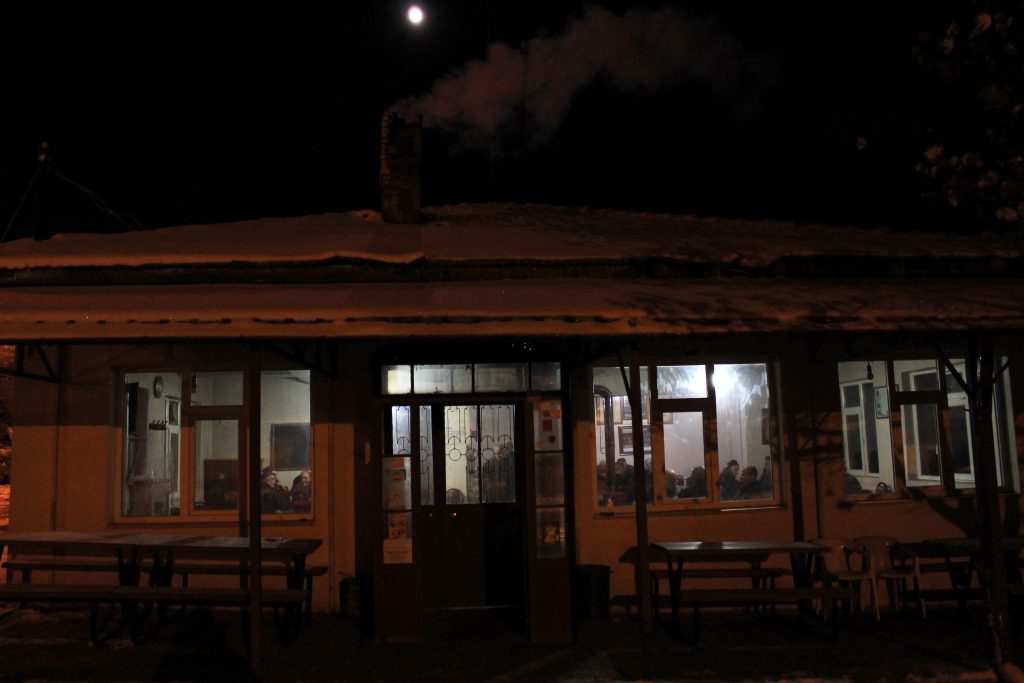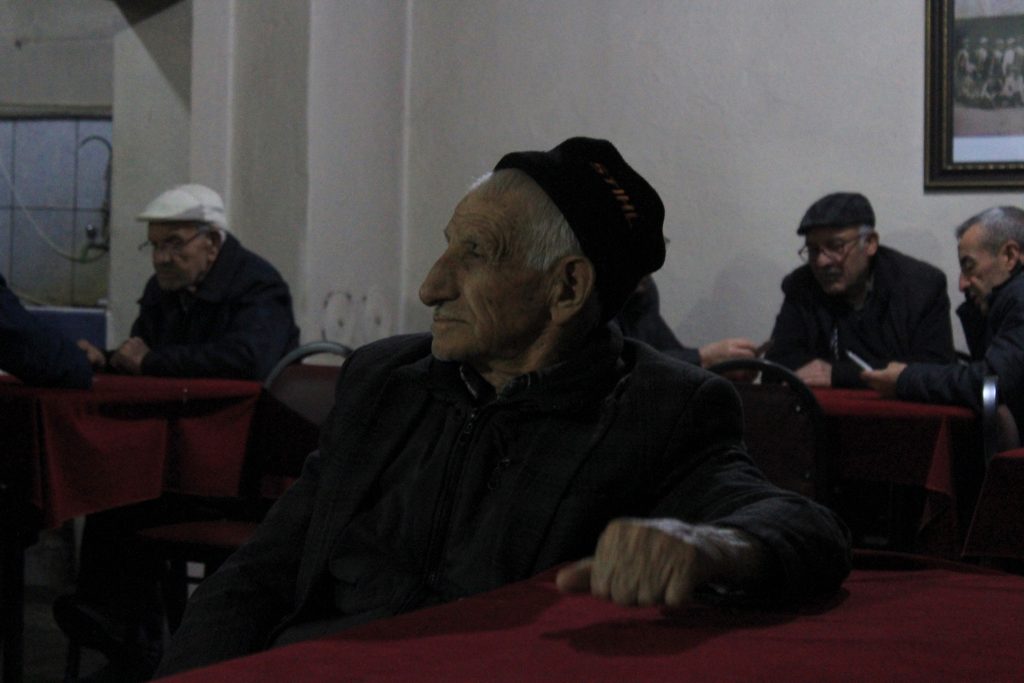Türkiye
Three women in a Turkish Kiraathane
It is the sixth day of our journey in the Turkish hinterland and at the first light of dawn we are already ready to visit the famous thermal baths of Pamukkale. This site, declared a UNESCO World Heritage Site, stands majestically next to the ruins of Hierapolis, an ancient city from the Hellenistic-Roman era that has now become a precious archaeological area. The morning is dedicated to exploring this unique place, among travertine pools and ancient remains that tell thousand-year-old stories. The atmosphere rich in history and beauty envelops us, preparing us for the next stage of our journey.
The desire to add an unexpected chapter to our adventure pushed us to improvise an intermediate stop, a place we had not planned. We leave in the early afternoon towards Bozcaarmut, a village in the Pazaryeri district, Bilecik province. The location is recommended for the presence of Lake Bilecik and for being an oasis of serenity immersed in nature.
It's the three of us, young women at the wheel, with the world passing by outside the windows and the asphalt becoming our red carpet. Sitting at the helm of our faithful travel companion, we immerse ourselves in a parallel universe where driving becomes more than a means to reach a destination: a journey within ourselves. The hours pass and we are serenity in motion. We joke, laugh, sing, talk about everything and nothing, while the road becomes the stage for our adventures.
In the last few kilometers to the finish line, the landscape outside begins to change. We are approaching a mountain resort and the air itself seems to fog up the windshield making the atmosphere even more enveloping. Outside, the roads are tinged with white, a blanket of pure snow that transforms the landscape into a winter painting. Without realizing it, the road begins to become impervious, leading us through a series of hairpin bends framed by increasingly thick vegetation.
Driving becomes a challenge that tests the capabilities of our vehicle, whose wheels show little traction on an icy pavement. Our carefree attitude gives way to a shiver of apprehension. We huddle together, seeking comfort in that small space on four wheels that now feels safer, but also more vulnerable. Yet, despite the fear that makes its way into our hearts, there is a sense of unity stronger than ever. It is the three of us, intrepid travelers, united by a unique bond that makes every bend in the road, every snowy glimpse, an unforgettable part of our journey through Turkey.

We arrive safely in Bozcaarmut and, with a sigh of relief, hastily park our van in the first available space. We hurry to get out, eager to reduce the sense of strangeness that envelops the small mountain village. The silence is palpable, the reflection of the full moon on the snow caresses the roofs of the houses, everything out there is still and apparently asleep. The night is deep but a warm light, coming from a regularly shaped farmhouse, breaks the monotony of the darkness.
The biting cold outside spontaneously pushes us to scrutinize the farmhouse closely, to give in to the curiosity that tickles us. Lara goes to explore, but returns shortly after, calling us to advance with her. We approach the door that, with a resounding creak, resists opening, as if we were crossing a thin border between the known and the unknown.

We immediately perceive the atmosphere rich in history and tradition that pervades the place. We are welcomed by adult and elderly men, each immersed in their own business. The place has simple walls and grayed plaster, the brown wooden plank floor tells us of an absorbed history. Everything is concentrated in a large hall and a small utility room with a balcony overlooking the main room. Far from the appearance of a traditional bar, the environment reminds us more of a warm and simple domestic place.
In the center of the room, a small cast iron stove dominates, emanating an enveloping heat, seeming to be the beating heart of the place. Wooden tables, dressed with crumpled red tablecloths, dot the space. Each table hosts groups of friends, some immersed in card games, others intent on watching TV. Lively conversations take place that evening, while some simply abandon themselves to total idleness on the chairs.
The first step over the threshold seems to stop time for an instant. A very brief silence envelops the place, but now we are there and the warmth pushes us forward. We look for our place at the only free table, reassured by the nod of a genuine and warm smile from an elderly man sitting towards the back of the room.


From the very beginning, our personalities clearly emerge through distinct reactions.
Lara, with her free and adventurous spirit, unhesitatingly takes out her camera to give vent to the growing emotion and enthusiasm that pervades her. She moves with agility from one corner to another, almost dancing between the shadows and the lights, incessantly seeking the perfect position to capture the most suggestive shots. The men present in the room show no sign of annoyance at the incessant clicking of the lens. On the contrary, they seem to embrace the situation with an aura of complicity, assuming almost static poses, as if they were spontaneously participating in a tableau vivant.
Martina, with a more thoughtful and cautious soul, wraps himself in his coat as if in a safe refuge. His look, tense and worried, reveals a growing restlessness. With an insistent and pounding voice like the beating of a breathless heart, he continues to urge them to return to the car. His desire for safety and familiarity shines through in every gesture and in his apprehensive words.
Nicole he finds himself in a delicate position, balancing between two opposites: on the one hand, he tries to contain Lara's expansiveness, which with her enthusiastic nature could convey a sense of invasiveness; on the other, he tries to reassure Martina, visibly uncomfortable with the unexpected situation. He tries to grasp the experience with spontaneity and openness, so despite the language barrier, he approaches the waiter to order some chai tea. In the end, he lights a cigarette, immersing himself in the gesture as if it were a consolidated ritual, in an attempt to convey a sense of sharing and respect for local customs.



We are carefully served with the classic and essential Turkish tea service, accompanied by a sugar cube. We begin to relax the tensions in our nerves, gradually feeling a sense of relief: it seems that our presence has found harmony with the surrounding environment. We can now carefully contemplate everything that surrounds us.
We finish our drink and, even before we even hint at wanting to repeat the round, the waiter comes to us with a new steaming service. The script repeats itself: cigarettes are smoked, tea is sipped and everyone continues with their own business, discussions, thoughts, silences. The cats, curled up in front of the fire, occasionally seek attention by tickling the legs of those present. To break this rhythm, there is the sporadic intermittence of loud laughter or shouts that resound from the gaming table.
Once the second cup is finished, we anticipate the waiter's attentions by promptly rolling up our coats. We head towards the door of the place as if closing a chapter, leaving behind a new adventure to tell. In that moment, gestures and glances merge to communicate what words could not fully express. It is a peaceful and satisfying farewell, like someone leaving a place enriched by new knowledge.

Only the next day, thanks to the precious information of a Turkish friend, we made an extraordinary discovery. The place we had visited so spontaneously was nothing other than a Kiraathane, a very rare example of a coffee shop that remained faithful to the Ottoman tradition. Located in a mountain village of just 215 inhabitants, this Kiraathane stood like a stronghold against external influences, preserving intact its historical and cultural essence, which, instead, had been lost over time in large and chaotic cities like Istanbul.
In Turkey, coffee has played a significant role in social life. The first coffee houses, called “Kiraathane,” opened in 1554. These places became vital centers of social gathering, promoting a sense of belonging and communication among male individuals. However, coffee houses were often criticized and banned by the authorities, who saw them as potential hotbeds of rebellion. Despite this, however, they spread throughout Turkey, establishing themselves as an authentic cultural symbol. We were told that “entering a Kiraathane is not for women,” but, unaware of the tradition of Kiraathane, we crossed the threshold without hesitation, defying the customs that still exist. Currently, Turkish women avoid frequenting Kiraathane because of this historic ban and the fact that many of them do not feel comfortable in such places. Instead, there are places specifically designed for female attendance, known as Hanimlar lokali.
In this meeting, our different cultural identities merged, generating a deep sense of belonging and this millenary tradition seems to have given way to an innate human connection, revealing a common desire for mutual understanding. This meeting becomes a symbol of how hospitality can overcome historical differences, opening the doors to an enriching exchange of experiences and the consolidation of deep human bonds.
This experience represents a precious chapter in our adventure, teaching us the importance of putting ourselves on the line, overcoming fears and embracing the unknown. It is a fragment of a mosaic of experiences that made us understand that travel is not only a physical path but also an opportunity for personal growth and opening up to new horizons.
Diversity is sometimes scary but if you are open to welcoming it, it opens up opportunities for understanding and deep knowledge: "differences in habits and languages do not matter if our intentions are identical and our hearts are open". JK ROWLING
Article by Nicole Pizzolato. Fphoto by Lara Berthod